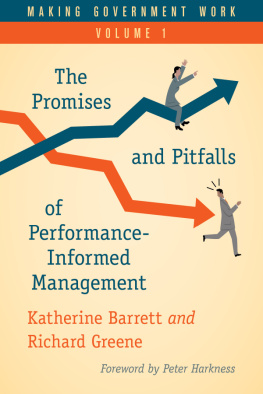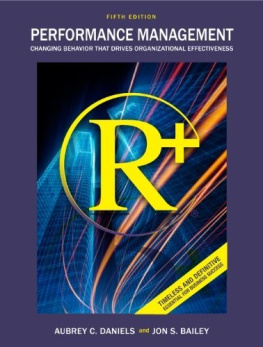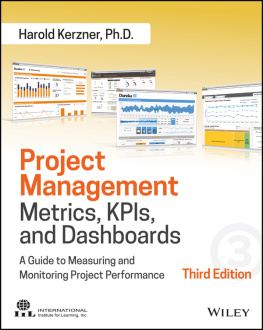Contents
i
Making Government Work
Volume 1
The Promises and
Pitfalls of
Performance-Informed
Management
Katherine Barrett
and Richard Greene
Foreword by Peter Harkness
ROWMAN & LITTLEFIELD
Lanham Boulder New York London
ii
Executive Editor: Traci Crowell
Assistant Editor: Deni Remsberg
Higher Education Channel Manager: Jonathan Raeder
Credits and acknowledgments for material borrowed from other sources, and reproduced with permission, appear on the appropriate page within the text.
Published by Rowman & Littlefield
An imprint of The Rowman & Littlefield Publishing Group, Inc.
4501 Forbes Boulevard, Suite 200, Lanham, Maryland 20706
www.rowman.com
6 Tinworth Street, London SE11 5AL, United Kingdom
Copyright 2020 by The Rowman & Littlefield Publishing Group, Inc.
All rights reserved . No part of this book may be reproduced in any form or by any electronic or mechanical means, including information storage and retrieval systems, without written permission from the publisher, except by a reviewer who may quote passages in a review.
British Library Cataloguing in Publication Information Available
Library of Congress Cataloging-in-Publication Data
Names: Barrett, Katherine, 1954- author. | Greene, Richard, 1955- author.
Title: Making government work: the promises and pitfalls of performance-informed management / Katherine Barrett, Richard Greene.
Description: Lanham, Maryland: Rowman & Littlefield, 2020. | Includes bibliographical references and index.
Identifiers: LCCN 2019046456 | ISBN 9781538125670 (cloth) | ISBN 9781538125687 (paperback) | ISBN 9781538125694 (epub)
Subjects: LCSH: Government accountabilityUnited States. | Public administrationUnited StatesEvaluation. | Administrative agenciesUnited StatesManagement. | Government productivityUnited States. | Organizational effectivenessUnited States.
Classification: LCC JK421 .B275 2020 | DDC 352.6/6dc23
LC record available at https://lccn.loc.gov/2019046456
 The paper used in this publication meets the minimum requirements of American National Standard for Information SciencesPermanence of Paper for Printed Library Materials, ANSI/NISO Z39.481992.
The paper used in this publication meets the minimum requirements of American National Standard for Information SciencesPermanence of Paper for Printed Library Materials, ANSI/NISO Z39.481992.
iii
This book is dedicated to Nancy Barrett, with our love and thanks for her immeasurable quest to bring happiness to the world.
iv v
Contents
vi vii viii ix
Acknowledgments
About three decades ago, when we first started exploring the field of performance management (although at the time we were calling it managing for results), a great many people in the public sector and in the press were minimally conscious of the phenomenon. After writing a long feature about it, long before we were associated with Governing magazine, one of our editors went on a radio show and described our work as being about pay for performance. That was quite an embarrassment.
But in all the years that have passed, weve been increasingly intrigued by performance management efforts. As things stand, we fall somewhere in between describing ourselves as skeptics and zealots.
We are not academics, and although we have participated in academic exercises, were journalists at heart. As a result, weve had the pleasure of interviewing a seemingly endless list of practitioners, elected officials, academics, organization leaders, and so on. This approach, we always felt, benefited us tremendously by giving us the opportunity to go beyond simple commentary as youd find in survey forms, and to ask follow-up questions, and follow-up questions to the follow-up questions.
Wed like to take this opportunity to give rich thanks to a number of the men and women who educated us about performance management. In some cases, they were interviewed specifically for this book, in an effort to make it as timely as possible. In others, they have been x our mentors for a number of years, helping us find our way to the on-ramp to the performance measurement highway.
We apologize if weve missed any names. But among those who we view as particularly important supporters of our work and generous suppliers of context and information from the early stages on are Terrell Blodget, Jonathan Bruel, Jay Fountain, Deborah Kerr, Mark Funkhouser, Harry Hatry, John Kamensky, Shelley Metzenbaum, Scott Pattison, and Marv Weidner.
We would be remiss to leave out the men and women of the Pew Charitable Trusts and Governing magazine, who made the Government Performance Project (GPP) possible. They include Michele Mariani Vaughn, whom we jokingly called our partner in crime, as she, herself, did excessive amounts of work to keep us from collapsing under the weight of the projects inhuman workload. Others at the magazine always had our backs during the GPP years: Alan Ehrenhalt, Peter Harkness, Elder Witt, and Zach Patton, who acted as a reporter for us in the GPP and was executive editor at Governing magazine, until it ceased publication after the September 2019 issue. Additionally, Susan Urahn at Pew was instrumental in providing moral and internal support at the Pew Charitable Trusts.
We want to give a special mention to a couple of men who werent with us at the very beginning of this journey but have been unstintingly available to us in this work: Don Kettl and Philip Joyce.
And now comes the long list of men and women whom we consulted, interviewed, and checked information with. Some of them were instrumental along the way before we wrote word one, page one of this book; others joined in as we did the research directly intended for it, and still others helped us to procure images or to find documents. We were tempted to describe each individuals contribution (to separate the people who spent hours on the phone with us from others who pointed us to a document). But that would have led to a seemingly endless list of acknowledgments, and we chose, instead, to devote that space to chapters in the book itself.
We thank:
Joel Alter, David Ammons, Larisa Benson, Barbara Cohn Berman, Randall Bauer, Gary Blackmer, Ralph Blumenthal, Melissa Bridges, xi Inger Brinck, John Cape, Jim Chrisinger, Paul Decker, Amy Donahue, Sara Dube, Sam Edelstein, Amy Edwards, Sharon Erickson, Alexandra Fercak, Adria Finch, Myron Frans, Susan Fritzlen, Benjamin Greene, Sandra Greene, Al Gore, Lori Grange, Frank Fairbanks, Myron Frans, David Gottesman, Jed Herrmann, John Hicks, Marc Holzer, Maia Jachimowicz, Michael Jacobson;
Hollie Jensen, Crista Johnson, Neal Johnson, Anne Jordan, Chris Kelly, Chelsea Lei, Penelope Lemov, Jim Lewis, Gary Locke, Megan Macvie, Zachary Markovits, Curt Marshall, Kelly Martinelli, Melissa Maynard, Nick Mastronadi, Heidi McGregor, Chris Mihm, Rakesh Mohan, Don Moynihan, Melissa Schigoda, Ken Miller, Jerry Newfarmer, Kimberly Olivares;
Cory Poris Plasch, Brooks Rainwater, Robin Rosenberg, Charles Sallee, Torey Salloway, Melissa Schigoda, Sherry Schoonover, Susan Sieg, Steven Rathgeb Smith, David Smith, Kathryn Stack, Brent Stockwell, Paul Taylor, Leah Tivoli, Susan Sieg Tompkins, Dick Tracy, Jeffrey Tryens, John Turcotte, Diana Urban, Ed Van Eenoo, Gary VanLandingham, James Wagner, Jonathan Walters, Melissa Wavelet, Darcy White, Kathryn Vesey White, Gaye Williams, Kathryn Newcomer, Juan Urbano, Katherine Willoughby, Quentin Wilson, Will Wilson, Oliver Wise, J.B. Wogan, and Lyle Wray.
We would also like to thank the reviewers of this text: Donald F. Kettl (University of Texas at Austin), Andrew Kleine, Lyle D. Wray (Metro State University), Deborah L. Kerr (Texas A&M University), and Alexandra Fercak.










 The paper used in this publication meets the minimum requirements of American National Standard for Information SciencesPermanence of Paper for Printed Library Materials, ANSI/NISO Z39.481992.
The paper used in this publication meets the minimum requirements of American National Standard for Information SciencesPermanence of Paper for Printed Library Materials, ANSI/NISO Z39.481992.